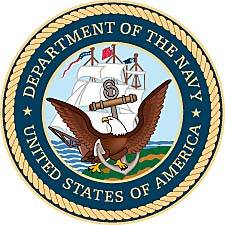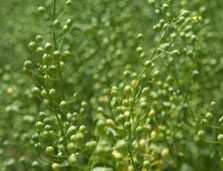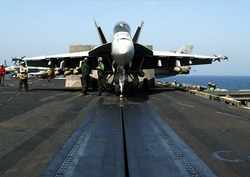Bio-Fuel Will Support Navy’s Certification Testing
Program
 Sustainable Oils, a producer of camelina-based fuels,
announced Thursday it has been awarded a contract by the Defense
Energy Support Center (DESC) for 40,000 gallons of camelina-based
jet fuel. The fuel will be delivered to the Naval Air Systems
Command (NAVAIR) fuels team in 2009 and will support the
Navy’s certification testing program of alternative fuels.
The contract includes an option to supply up to an additional
150,000 gallons of camelina-based jet fuel.
Sustainable Oils, a producer of camelina-based fuels,
announced Thursday it has been awarded a contract by the Defense
Energy Support Center (DESC) for 40,000 gallons of camelina-based
jet fuel. The fuel will be delivered to the Naval Air Systems
Command (NAVAIR) fuels team in 2009 and will support the
Navy’s certification testing program of alternative fuels.
The contract includes an option to supply up to an additional
150,000 gallons of camelina-based jet fuel.
 “This is a substantial endorsement of the years of
research and development Sustainable Oils has been doing to improve
camelina as a next generation feedstock,” said Scott Johnson,
president of Sustainable Oils as well as president of the North
American Camelina Trade Association. “Our camelina-based
biojet fuel has already performed as well its petroleum
counterparts in aviation tests involving a Boeing 747-300.
We’re expecting similar performance with different, and even
more demanding aircraft. I can think of nothing more appropriate
for our nation’s defense aircraft than to be running on
domestically-produced fuel.”
“This is a substantial endorsement of the years of
research and development Sustainable Oils has been doing to improve
camelina as a next generation feedstock,” said Scott Johnson,
president of Sustainable Oils as well as president of the North
American Camelina Trade Association. “Our camelina-based
biojet fuel has already performed as well its petroleum
counterparts in aviation tests involving a Boeing 747-300.
We’re expecting similar performance with different, and even
more demanding aircraft. I can think of nothing more appropriate
for our nation’s defense aircraft than to be running on
domestically-produced fuel.”
Camelina was selected by the DESC because it does not compete
with food crops, has been proven to reduce carbon emissions by more
than 80 percent, and has already been successfully tested in a
commercial airline test flight. In addition, camelina has naturally
high oil content, is drought tolerant and requires less fertilizer
and herbicides. It is an excellent rotation crop with wheat, and it
can also grow on marginal land.
Camelina is the most readily available renewable fuel feedstock
that meets the Navy’s criteria, with the ability to scale up
acreage to meet demand. The camelina for the contract was primarily
grown in 2009 and harvested recently by farmers in Montana. The
company also has several field trials in Washington state.

Camelina Plant
Sustainable Oils has the largest camelina research program in
the nation. The company’s camelina breeding program began in
2005 and has steadily expanded to include more than 140 trials
across North America from 2005-2009. The company is also evaluating
more than 90 breeding populations of camelina to analyze agronomic
and oil qualities and to develop new high-yielding varieties.
Sustainable Oils leverages biotechnology resources from its
Seattle-based agricultural biotech parent company Targeted
Growth.
“This contract reflects the great promise of camelina as a
readily-available drop-in replacement for aviation fuel,”
said Johnson. “It also sends a strong message to farmers that
there will be a long term market for camelina oil. We look forward
to working with an even larger group of growers in 2010 to meet the
increased demand.”
Camelina has also been proven to significantly reduce carbon
emissions in aviation fuel. A life cycle analysis (LCA) of jet fuel
created from camelina conducted at Michigan Tech University in
conjunction with UOP LLC, a Honeywell Company, and Sustainable Oils
found that the renewable fuel reduces carbon emissions by 80
percent compared to petroleum jet fuel.
In January, Sustainable Oils sourced the camelina for Japan
Airlines’ biojet demonstration flight, whose biofuel blend
was comprised primarily of camelina. In August, camelina again
performed under high-test conditions in a 100 percent blend of fuel
powering the Boeing U-787 hydroplane in a series of demonstration
laps at the Seafair Cup in Seattle.

The upcoming Navy tests are part of a larger effort to test and
certify promising biofuels in support of the Navy and Department of
Defense’s strategy to enhance energy security and reduce
greenhouse gas emissions.
"DESC is partnering with the Navy to move this alternative fuel
demonstration forward," said Mark Iden, deputy director of
operations for DESC. "This initiative also supports the DoD's
desire to meet the intent and goals of the Energy Policy Act of
2005 and the Energy Independence and Security Act of 2007."
 SpaceX to Launch Inversion RAY Reentry Vehicle in Fall
SpaceX to Launch Inversion RAY Reentry Vehicle in Fall Aero-News: Quote of the Day (04.23.24)
Aero-News: Quote of the Day (04.23.24) Aero-News: Quote of the Day (04.20.24)
Aero-News: Quote of the Day (04.20.24) ANN's Daily Aero-Linx (04.20.24)
ANN's Daily Aero-Linx (04.20.24) Aero-News: Quote of the Day (04.21.24)
Aero-News: Quote of the Day (04.21.24)






